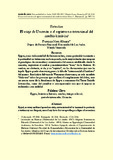Mostrar el registro sencillo del ítem
El viaje de Unamón o el registro no intencional del cambio histórico
| dc.rights.license | http://creativecommons.org/licenses/by-nc-sa/3.0/ve/ | |
| dc.contributor.author | Moro Albacete, Francisco | |
| dc.date.accessioned | 2017-03-07T19:42:22Z | |
| dc.date.available | 2017-03-07T19:42:22Z | |
| dc.date.issued | 2016-01 | |
| dc.identifier.issn | 1856-9927 | |
| dc.identifier.uri | http://www.saber.ula.ve/handle/123456789/43136 | |
| dc.description.abstract | Egipto, como toda sociedad de discurso mítico, nunca pretendió transmitir a la posteridad un testimonio ni de su pasado, ni de ningún hecho que escapase al paradigma de recreación y conservación del cosmos establecido desde la creación, negándose al cambio y manteniéndose “fuera” de la Historia. El cambio, no obstante, se da; y su “registro”, en los documentos que nos ha legado Egipto puede observarse, pese a la falta de “intencionalidad histórica” del mismo. En el relato del viaje de Wenamun observamos, no solo un relato “didáctico” sobre las penurias que conlleva el cumplimiento del deber, sino un retrato tanto de la decadencia de Egipto a comienzos del Tercer Período Intermedio, como del asombro e incomprensión con que el egipcio se enfrentaba a esa realidad. | es_VE |
| dc.language.iso | es | es_VE |
| dc.rights | info:eu-repo/semantics/openAccess | |
| dc.subject | Egipto | es_VE |
| dc.subject | Literatura | es_VE |
| dc.subject | Historia | es_VE |
| dc.subject | Cambio | es_VE |
| dc.subject | Tiempo cultural | es_VE |
| dc.subject | Período intermedio | es_VE |
| dc.subject | Unamón | es_VE |
| dc.title | El viaje de Unamón o el registro no intencional del cambio histórico | es_VE |
| dc.title.alternative | The voyage of Wenamun or unintentional record of historical change | es_VE |
| dc.type | info:eu-repo/semantics/article | |
| dc.description.abstract1 | Egypt, as every mythical speech society, never intended to transmit to posterity a testimony nor his past, nor of any facts that escape the paradigm of recreation and conservation of the cosmos established from creation time, refusing the change and staying “outside” History. The change, however, occurs, and its “record” can be seen in the documents bequeathed by Egypt, despite its lack of “historical intentionality”. In the story of the Voyage of Wenamunwe observe not just a “didactic” story about the hardships involved the line of duty, but a portrait of both the decline of Egypt at the beginning of the Third Intermediate Period, and the astonishment and incomprehension that the Egyptian man faced that reality. | es_VE |
| dc.description.colacion | 209-224 | es_VE |
| dc.description.email | franciscomoroalbacete@yahoo.es | es_VE |
| dc.description.frecuencia | Anual | |
| dc.identifier.depositolegal | PP200908ME20 | |
| dc.publisher.pais | Venezuela | es_VE |
| dc.subject.centroinvestigacion | Centro de Investigaciones en Ciencias Humanas (HUMANIC) | |
| dc.subject.centroinvestigacion | Grupo de Investigaciones sobre Historia de las Ideas en América Latina (GRHIAL) | |
| dc.subject.facultad | Facultad de Humanidades y Educación | es_VE |
| dc.subject.keywords | Egypt | es_VE |
| dc.subject.keywords | Literature | es_VE |
| dc.subject.keywords | History | es_VE |
| dc.subject.keywords | Change | es_VE |
| dc.subject.keywords | Cultural time | es_VE |
| dc.subject.keywords | Intermediate periode | es_VE |
| dc.subject.keywords | Wenamun | es_VE |
| dc.subject.seccion | Anuario GRHIAL: Estudios | es_VE |
| dc.subject.thematiccategory | Artes y Humanidades | es_VE |
| dc.subject.tipo | Revistas | es_VE |
| dc.type.media | Texto | es_VE |
Ficheros en el ítem
Este ítem aparece en la(s) siguiente(s) colección(ones)
-
Anuario GRHIAL Año 010 - Nº 010
Enero - Diciembre 2016


